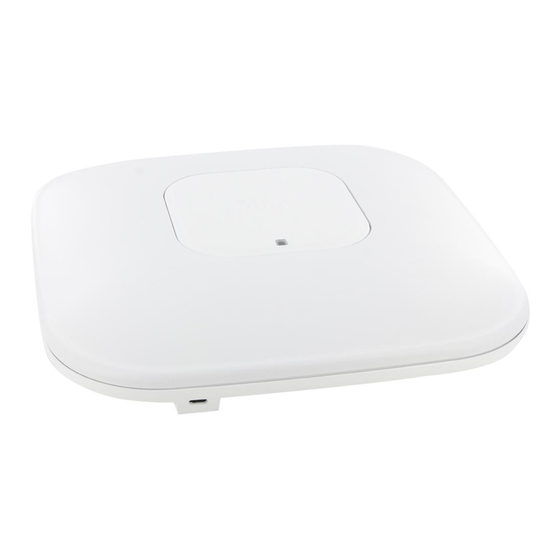Cisco WS-C3550-12T Fiche technique - Page 6
Parcourez en ligne ou téléchargez le pdf Fiche technique pour {nom_de_la_catégorie} Cisco WS-C3550-12T. Cisco WS-C3550-12T 19 pages. 3500 series lightweight access point
Également pour Cisco WS-C3550-12T : Manuel de démarrage (35 pages)

Table 1. Product Features and Benefits
Feature
Benefit
AVAILABILITY/SCALABILITY
High-Performance
IP Routing
Superior Redundancy
for Fault Backup
Integrated Cisco IOS
Features for
Bandwidth
Optimization
Important notices, privacy statements, and trademarks of Cisco Systems, Inc. can be found on cisco.com.
Cisco Express Forwarding (CEF)-based routing architecture performed in hardware to deliver extremely high-
performance IP routing.
Support for basic IP unicast routing protocols (static, RIPv1, RIPv2) for small network routing applications.
Support for advanced IP unicast routing protocols (OSPF, IGRP, EIGRP, BGPv4) for load balancing and
constructing scalable LANs – requires EMI.
Inter-VLAN IP routing for full Layer 3 routing between two or more VLANs.
Equal cost routing for load balancing and redundancy.
Protocol-Independent Multicast (PIM) for IP multicast routing within a network that enables the network to receive
the multicast feed requested and for switches not participating in the multicast to be pruned support for PIM sparse
mode (PIM-SM), PIM dense mode (PIM-DM), and PIM sparse-dense mode – requires EMI.
Distance Vector Multicast Routing Protocol (DVMRP) tunneling for interconnecting two multicast-enabled networks
across non-multicast networks—requires EMI.
Fallback bridging for forwarding of non-IP traffic between two or more VLANs.
Cisco Hot Standby Router Protocol (HSRP) to create redundant fail-safe routing topologies.
Cisco UplinkFast/BackboneFast technologies ensure quick fail-over recovery enhancing overall network stability
and reliability. CrossStack UplinkFast (CSUF) technology provides increased redundancy and network resiliency
through fast spanning-tree convergence (less than two seconds) across a stack of switches using GigaStack GBICs in
an independent stack backplane cascaded configuration.
IEEE 802.1w Rapid Spanning Tree Protocol (RSTP) provides rapid convergence of the spanning tree independent
of spanning-tree timers.
Supports Cisco HSRP to create redundant fail-safe routing topologies.
Redundant stacking connections provide support for a redundant loopback connection for top and bottom switches in
an independent stack backplane cascaded configuration.
Command switch redundancy enabled in the CMS Software allows customers to designate a backup command
switch that takes over cluster management functions if the primary command switch fails.
Provides unidirectional link detection (UDLD) and Aggressive UDLD for detecting and disabling unidirectional
links on fiber-optic interfaces caused by incorrect fiber-optic wiring or port faults.
Switch port Auto-recovery (or "errDisable") automatically attempts to re-enable a link that becomes disabled due to a
network error.
Support for Cisco's optional Redundant Power System 300 (RPS 300 supports all Catalyst 3550 Switches except the
Catalyst 3550-24 PWR) and/or the Redundant Power System 675 (RPS 675 supports all Catalyst 3550 Switches)
that provides superior internal power source redundancy for up to six Cisco networking devices resulting in
improved fault tolerance and network uptime.
Bandwidth aggregation of up to 16 Gbps through Gigabit EtherChannel technology and up to 1.6 Gbps through Fast
EtherChannel technology enhances fault tolerance and offers higher speed aggregated bandwidth between switches,
to routers and individual servers. Per-port broadcast, multicast, and unicast storm control prevents faulty end stations
from degrading overall systems performance.
WCCP allows the interaction with a web cache for the purpose of redirecting content requests to a cache and
performing basic load balancing across multiple caches—requires EMI.
IEEE 802.1D Spanning-Tree Protocol support for redundant backbone connections and loop-free networks simplifies
network configuration and improves fault tolerance.
© 2005 Cisco Systems, Inc. All rights reserved.
Page 6 of 18
